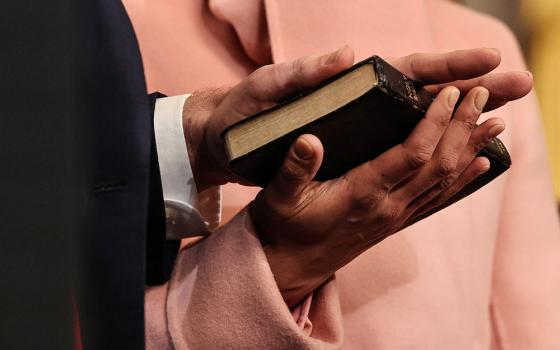I recently sat with a good friend as she received yet another round of chemo for reoccurring cancer. Our visit was a tender time of connecting and conversing about what really matters. My friend, a longtime spiritual seeker in the Catholic tradition, confessed that she doesn't really know for sure whether there is an afterlife. The notion that her body's molecules will melt into the "great-all" of the universe isn't so very attractive. This idea seems to be an extant theme in contemporary scientific-cosmological explanations about where we've come from and where we are going. From the perspective of pure biology, it seems quite correct.
But it doesn't go far enough for many people, including me.
Enter Dr. Eben Alexander's book Proof of Heaven. The author is a neurosurgeon who in 2008 fell victim to a rare form of bacterial meningitis that landed him in a weeklong coma. After many days of antibiotics failed to yield discernable improvement, Alexander's prospects for making a full recovery with all faculties intact were virtually nil. Yet he inexplicably recovered completely. His book chronicles a near-death experience that, according to prevailing scientific theories, never should have happened.
I have been fascinated by accounts of near-death experiences since graduate school, when my nursing studies focused on Dr. Elizabeth Kubler Ross' then-revolutionary work with death and dying and Dr. Raymond Moody's work Life after Life. Typically, people report being met and accompanied by deceased loved ones, floating above their bodies while medical personnel tried to revive them, and encountering an ineffable being of light who emanates unconditional love. Some report being offered a choice about whether to return to earthly life or not. Upon recovery, people said they experienced a heightened awareness that love is the most important thing in the world and they no longer feared death.
For the last 50 years, medical science has explained near-death experiences as the result of a gradual shutting down of the cells of the outer layers of the brain, the neocortex, that governs higher cognitive functions such as vision, hearing, memory, emotional responses, and abstract thinking. This is what Alexander himself believed when some of his patients shared stories of deceased loved ones who came to comfort them in their final days.
Since bacterial meningitis attacks the connective tissue (or meninges), lining the neocortex, Alexander believes the severe intractability of his infection meant his neocortex was completely "offline," making any near-death experience theoretically impossible in his case. While some have criticized Alexander's science, no one disputes that he was all but dead, yet came back to tell about it.
His life was completely changed by the experience: "[It] healed my fragmented soul. It had let me know that I had always been loved, and it also showed me that absolutely everyone else in the universe is loved, too." Alexander now works to bridge the gap between materialist understandings of a soulless, somewhat mechanistic universe and new empirical discoveries in quantum mechanics and the domains of consciousness and spirituality.
His most recent book, The Map of Heaven, explores what science, religion and ancient wisdom from luminaries such as Plato, the Dalai Lama and Carl Jung have to offer.
At the heart of the debate is the nature of human consciousness. Scientific materialists believe human consciousness is the product of physical brain functions. When the brain dies, consciousness (and that which makes us quintessentially human) dies along with it. Other, "post-materialist scientists" believe this construct cannot be proven and ignores abundant empirical evidence to the contrary.
While acknowledging that scientific methods based upon materialistic philosophy have advanced technology and increased our understanding of the natural world, the post-materialist scientists point to discoveries in quantum mechanics in which the particles being observed, and the scientists observing them, are linked. This implies, they say, that "the consciousness of the observer is vital to the existence of the physical events being observed, and that mental events can affect the physical world." To challenge the "dogma" of materialist philosophy in scientific studies, in January 2014, over 100 scientists called for an open study of all aspects of consciousness.
More germane to this article, a recent multidisciplinary post-materialist manifesto said in part: "Near death experiences in cardiac arrest suggest that the brain acts as a transceiver of mental activity, i.e. the mind can work through the brain, but is not produced by it. Near death experiences occurring in cardiac arrest, coupled with evidence from research mediums, further suggest the survival of consciousness, following bodily death, and the existence of other levels of reality that are non-physical."
Scientists, the manifesto went on to say, "should not be afraid to investigate spirituality and spiritual experiences since they represent a central aspect of human existence."
In other words, my friends, even the venerable scientific method seems ready to explore the ephemeral, ineffable nature of God-consciousness. Or at least our experiences of it, limited as we are in our ability to describe them.
And what of life after death? Well, it sure looks like there's a lot more experiential evidence out there than most of us ever realized.
And the neat part is, people's descriptions match up with what some of what the world's saints, mystics and sages have described. For example, Ignatius of Loyola once had a mystical experience "with so great an enlightenment ... It was if he were a new man with a new intellect." Alexander writes that when he posed questions, "the answer came instantly in an explosion of light, color, love and beauty ... Thoughts entered me directly. But it wasn't thought like we experience on earth ... as I receive them I was able to instantly and effortlessly understand concepts that would have taken me years to full grasp in my earthly life."
Upon drawing close to what he calls "the Core" (where God is), Alexander finds an "immense void, completely dark, infinite in size, yet also infinitely comforting. Pitch black as it was, it was also brimming over with light." His experience recalls John of the Cross' beautiful poetry in Dark Night of the Soul: "Oh night thou was my guide. Oh night more loving than the rising sun. Oh night that joined the lover to the beloved one transforming each of them into the other."
My favorite quotation from Alexander's odyssey evokes Julian of Norwich's understanding of God as a mother: "My situation was, strangely enough, something akin to that of a fetus in a womb ... with the silent partner of the placenta, which nourishes it and mediates its relationship to the everywhere present yet at the same time invisible mother. In this case, the 'mother' was God, the Creator, the Source who is responsible for making the universe and all in it. This Being was so close that there seemed to be no distance at all between God and myself. Yet at the same time, I could sense the infinite vastness of the Creator, could see how completely miniscule I was by comparison."
So, yes, I gave my friend Proof of Heaven to read. While I doubt that anyone can "prove" God or heaven to anyone else, we may be able to help our loved ones open up to experiencing the too-good-to-be-true possibility that God does exist and loves us eternally.
Since my friend is a big fan of both John of the Cross and Zen meditation, I sort of think God's got this one covered.
[A Sister of St. Joseph, Sr. Christine Schenk served urban families for 18 years as a nurse midwife before co-founding FutureChurch, where she served for 23 years. She holds master's degrees in nursing and theology.]
Editor's note: We can send you an email alert every time Christine Schenk's column, Simply Spirit, is posted. Go to this page and follow directions: Email alert sign-up.




